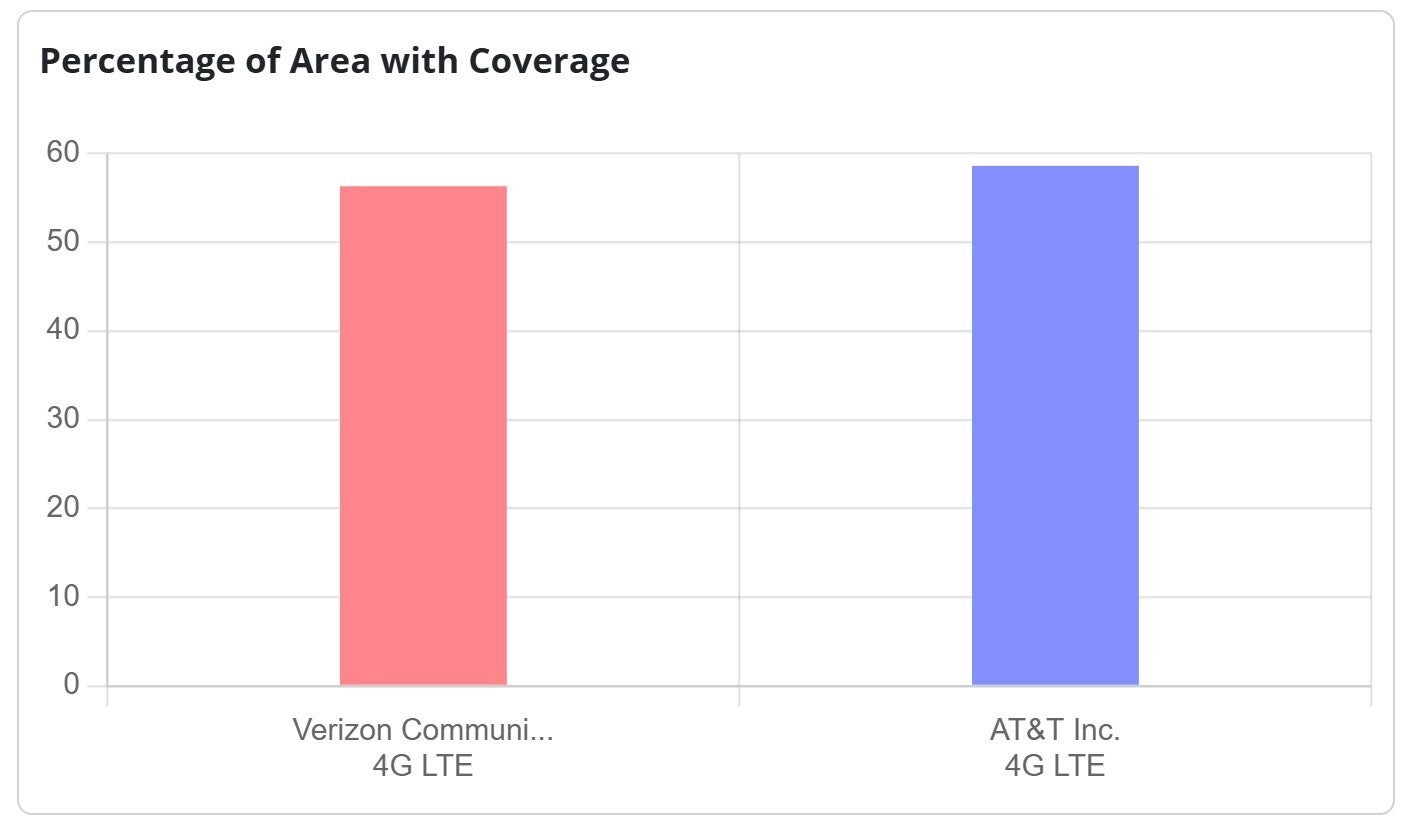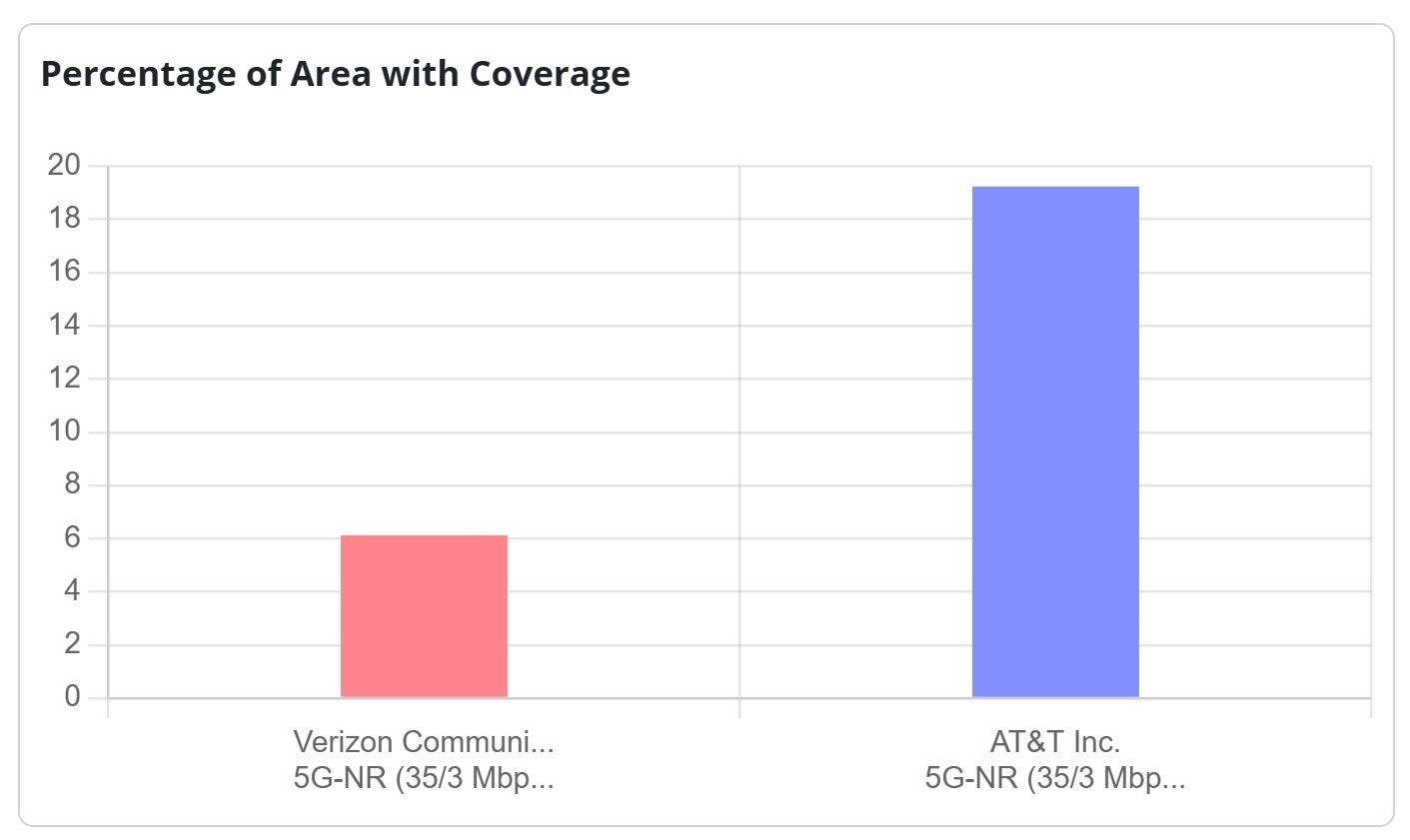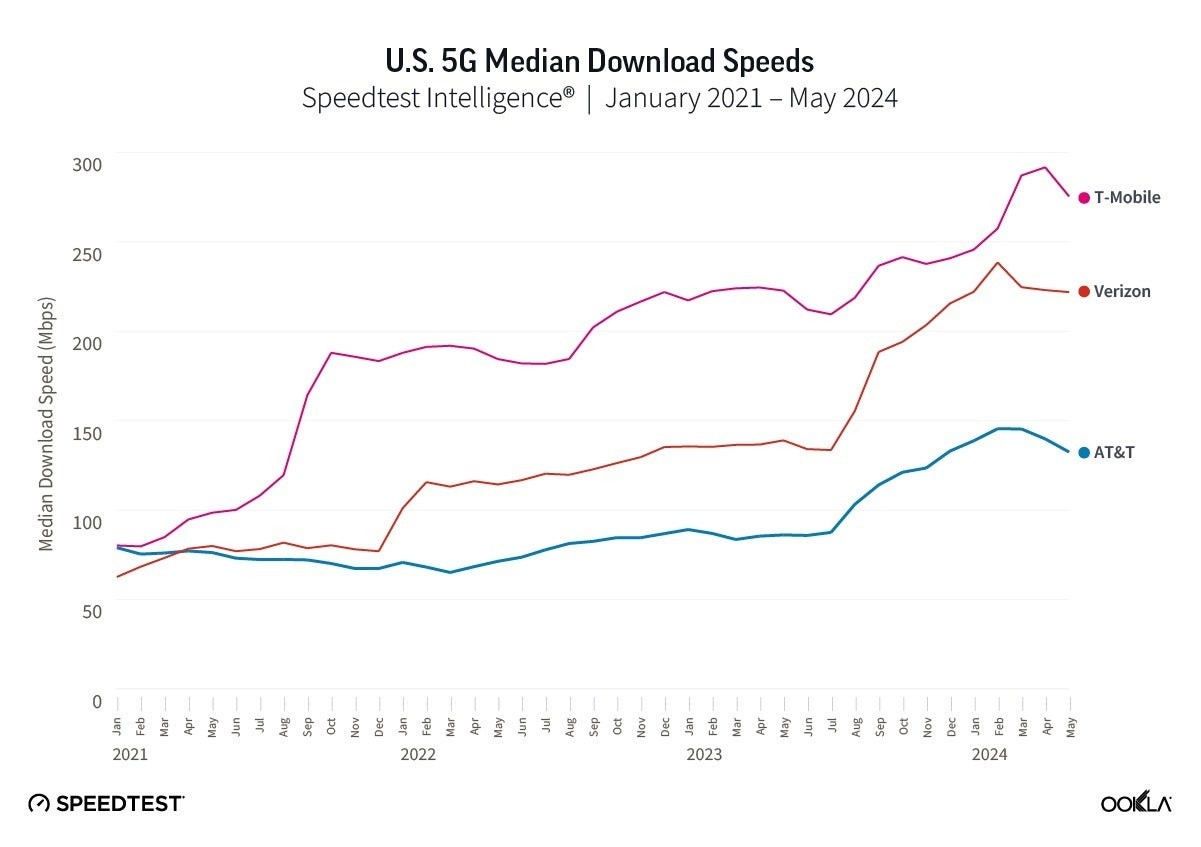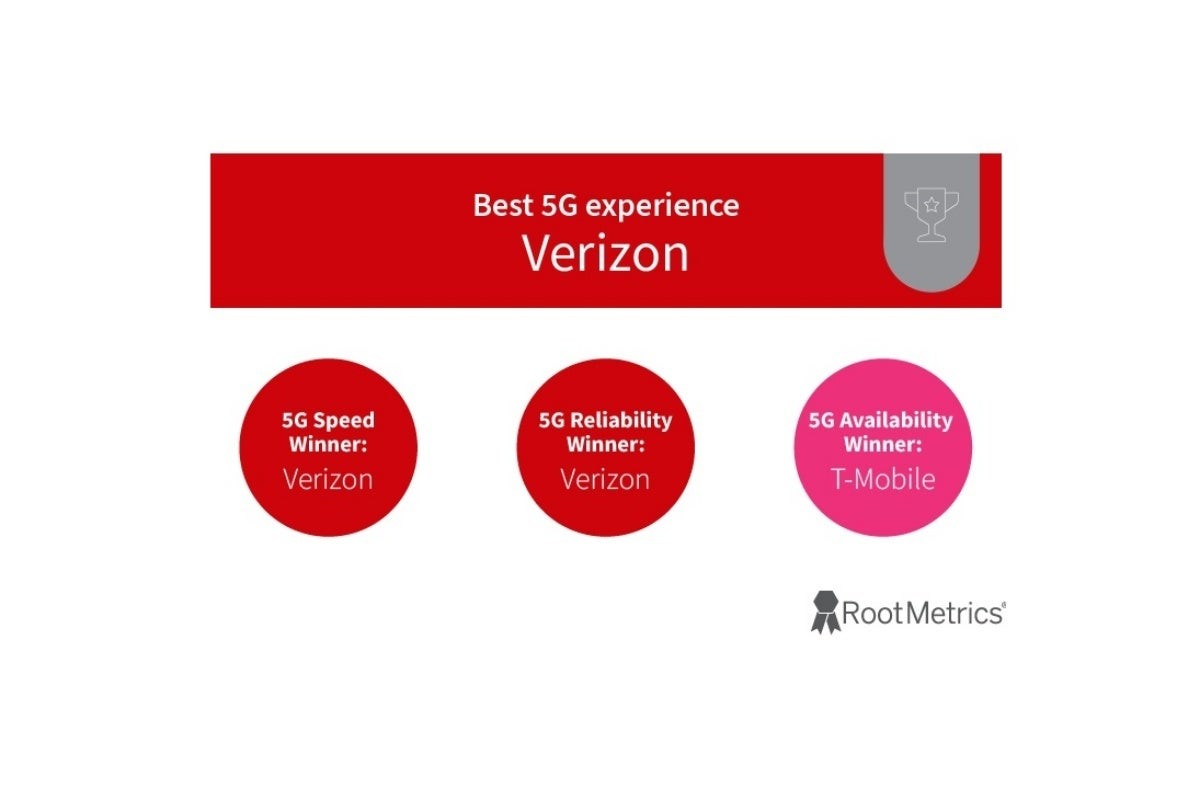1. Verizon vs. AT&T: A Detailed Overview
Verizon and AT&T have been giants in the telecommunications industry for decades. Both offer a wide array of services, including mobile phone plans, internet, and television. However, they differ significantly in their approach to coverage, speed, pricing, and additional perks. Choosing between these two requires a careful examination of what each brings to the table.
1.1. Verizon: Strengths and Weaknesses
Verizon is often lauded for its robust network and extensive coverage, particularly in rural areas. It provides a wide range of devices and plans. However, its 5G network rollout has been somewhat slower compared to AT&T.
Pros:
- Extensive network coverage, especially in rural areas
- Generous hotspot data allocations
- Wide selection of phone choices
Cons:
- Slower 5G network deployment compared to AT&T
- Streaming services require additional payment
1.2. AT&T: Strengths and Weaknesses
AT&T boasts the largest carrier network in the U.S., with significant 5G coverage. Its plans are often more budget-friendly, especially for families. However, its device selection is more limited, and it lacks the extensive streaming perks offered by Verizon.
Pros:
- Extensive nationwide coverage
- Broad 5G network presence
- Competitive family plan pricing
Cons:
- Limited phone selection
- Fewer streaming perks
2. Pricing and Plans: A Cost Comparison
When comparing AT&T and Verizon, pricing and available plans are key considerations. Understanding the costs associated with various options can help you make a budget-conscious decision.
2.1. Entry-Level 5G Plans
- Verizon’s Cheapest 5G Plan: Unlimited Welcome plan starting at $30 per line for four lines, with potential throttling.
- AT&T’s Cheapest 5G Plan: $25 per line per month for four lines, also with potential throttling.
AT&T provides a slightly more affordable entry point, but both plans come with the possibility of throttled speeds during peak times.
2.2. Premium Unlimited 5G Plans
For users seeking premium, unthrottled data and additional features, both carriers offer enhanced plans. The table below outlines the costs for Verizon’s Unlimited Ultimate and AT&T’s Unlimited Premium plans:
| Feature | Verizon Unlimited Ultimate | AT&T Unlimited Premium |
|---|---|---|
| 1 Line | $90 | $85 |
| 2 Lines | $160 | $150 |
| 3 Lines | $195 | $180 |
| 4 Lines | $220 | $200 |
| Throttling | No | No |
| Freebies | Disney+, Hulu, ESPN+ for $10/mo. Netflix & Max for $10/mo.International talk, text & 10GB datain 210+ cuntriesBoth new and existing customers eligible to receive the best current in-market smartphone offer with trade-in.Up to $540 BYID promo creditUnlimited talk and textUnlimited premium data | 60GB high-speed mobile hotspot dataUnlimited talk and textUnlimited premium data Free unlimited high-speed roaming in Canada and Mexico Free roaming in 19 Latin American countries, $10/day elsewhere Unlimited texting from the U.S. to 200+ countries AT&T ActiveArmor security app |
| Video Streaming | 1080p | 4K |
| Hotspot (Per Line) | 60GB | 60GB |





All prices are after Auto Pay and w/ paperless billing, including unlimited talk & text in the US.
AT&T tends to be more economical, while Verizon offers additional entertainment perks for an extra charge.
2.3. Family Plans
AT&T also provides an attractively priced family plan, offering unlimited 5G data for as low as $25 per line. Verizon’s equivalent plan starts at $30 per line. This can be a significant advantage for larger families looking to save on their monthly bill.
3. Coverage Comparison: Network Availability
Network coverage is crucial, especially if you live in or frequently travel to rural areas. Both Verizon and AT&T offer extensive coverage, but there are nuanced differences.
3.1. 4G LTE Coverage
According to the FCC, AT&T leads in overall network coverage, covering approximately 59% of the U.S., while Verizon covers about 56%. While Verizon is often praised for its performance in rural areas, AT&T’s broader coverage ensures fewer gaps across different regions.
3.2. 5G Coverage
When it comes to 5G coverage, AT&T also leads in low-band and mid-band coverage. AT&T covers 29% of the area, while Verizon covers 9% for low-band. Similarly, AT&T has 18% coverage for mid-band, compared to Verizon’s 6%. AT&T has significantly expanded its 5G network, covering over 290 million people in the U.S.
3.3. Geographic Considerations
Looking at coverage maps, Verizon’s 4G signal is stronger in the Northwest, but AT&T fills in more coverage gaps in other regions. Both carriers offer robust networks, but the best choice depends on where you live and travel most frequently.
4. Network Performance: Speed and Reliability
While coverage is essential, network performance directly impacts user experience. Download speeds and overall reliability vary between Verizon and AT&T.
4.1. Download Speeds
Verizon’s 5G network utilizes ultra-fast mmWave technology, providing a significant edge in speed performance compared to AT&T. According to independent testing, Verizon often outperforms AT&T in download speeds.
4.2. Network Reliability
Verizon is often regarded as the champion in network reliability and speeds. However, both carriers offer robust signals in most U.S. locations. Your specific location and usage patterns will influence which carrier provides a more consistent connection.
4.3. 5G Network Reliability
Verizon has been recognized as a US 5G network reliability champion by RootMetrics. This recognition underlines Verizon’s commitment to providing a seamless and consistent 5G experience for its users.
5. Device Selection: Phones and More
The availability of devices, including smartphones, is another critical factor. Verizon and AT&T offer different ranges of devices, influencing which carrier better meets your needs.
5.1. Number of Available Phones
Verizon offers a significantly larger selection of phones, with approximately 98 models available, compared to AT&T’s 39. This wider variety allows customers to choose from a broader range of brands and models.
5.2. Device Compatibility
Historically, AT&T, as a GSM carrier, had a more extensive phone selection. However, modern 5G modems are built to handle nearly every network type, allowing Verizon to significantly expand its device lineup.
5.3. Featured Device Lists
For a comprehensive list of available phones, you can explore dedicated device lists for both carriers:
- Best Verizon phones to buy in 2024
- The best AT&T phones to buy in 2024
6. Features and Perks: Added Benefits
Additional features and perks can enhance the overall value of a mobile plan. Verizon and AT&T offer different benefits, from streaming services to international data allowances.
6.1. Streaming Services
Verizon provides access to popular streaming services like Disney+, Hulu, ESPN+, Netflix, and Max for an additional $10 per month. AT&T has eliminated free HBO Max subscriptions, making it less attractive for streaming enthusiasts.
6.2. Mobile Hotspot and International Data
Both carriers offer generous 60GB mobile hotspot allowances. However, Verizon is more generous with international data, allowing users to access 10GB in most countries. AT&T charges $10 for international data, even on its premium plans.
7. Customer Service: Reliability and Satisfaction
Customer service is an integral part of the user experience. Knowing which carrier provides better support can influence your decision.
7.1. J.D. Power Rankings
According to the J.D. Power 2024 U.S. enterprise internet study, AT&T is preferred by large businesses for internet service, while Verizon is preferred by small businesses. In retail wireless customer service, Verizon ranks ahead of AT&T.
7.2. Business Customer Service
Verizon Wireless business customer service ranks second, with 739 points, just after T-Mobile. Verizon is the highest-ranked in the medium business segment, while large enterprises prefer AT&T.
8. Key Differences at a Glance
To summarize, the following table outlines the major differences between Verizon and AT&T:
| Feature | Verizon | AT&T |
|---|---|---|
| Network Coverage | Strong in rural areas | Broader nationwide coverage |
| 5G Speeds | Ultra-fast mmWave technology | Extensive 5G network coverage |
| Pricing | Generally more expensive | Generally more affordable |
| Phone Selection | Wider variety of devices | More limited device selection |
| Streaming Perks | Access to Disney+, Hulu, and ESPN+ for $10/mo. | Fewer streaming perks |
| Customer Service | Higher-ranked in retail wireless service | Preferred by large businesses for internet service |
9. Making the Right Choice: Factors to Consider
Choosing between Verizon and AT&T depends on your specific needs and priorities. Consider the following factors to make an informed decision:
9.1. Location
Evaluate network coverage and performance in your area. Check coverage maps and user reviews to determine which carrier offers better service where you live and travel.
9.2. Budget
Compare plan prices and assess whether you need premium features or can opt for a more affordable plan with potential throttling. AT&T often provides more budget-friendly options, especially for families.
9.3. Device Preference
If you have a specific phone in mind, check its availability on both networks. Verizon offers a wider selection, ensuring more options.
9.4. Usage Patterns
Consider your data usage, international travel, and streaming habits. Verizon’s generous international data and streaming perks may justify the higher cost if they align with your needs.
10. Frequently Asked Questions (FAQ)
Q1: Which carrier has better 5G coverage, Verizon or AT&T?
AT&T has broader 5G coverage, especially in low-band and mid-band spectrums, reaching more people across the U.S.
Q2: Which carrier offers more affordable plans?
AT&T generally offers more budget-friendly plans, particularly for families.
Q3: Does Verizon have better network reliability?
Yes, Verizon is often recognized for its strong network reliability, particularly in 5G performance.
Q4: Which carrier has a wider selection of phones?
Verizon provides a wider variety of phone models compared to AT&T.
Q5: What streaming perks do Verizon and AT&T offer?
Verizon offers access to Disney+, Hulu, ESPN+, Netflix, and Max for an additional $10 per month. AT&T has fewer streaming perks.
Q6: How does Verizon’s international data compare to AT&T’s?
Verizon is more generous with international data, offering 10GB in most countries, while AT&T charges $10 for international data.
Q7: Which carrier is preferred by businesses?
AT&T is preferred by large businesses for internet service, while Verizon is favored by small businesses.
Q8: What is the cheapest 5G plan offered by Verizon?
Verizon’s cheapest 5G plan is the Unlimited Welcome plan, starting at $30 per line for four lines, with potential throttling.
Q9: What is the cheapest 5G plan offered by AT&T?
AT&T’s cheapest 5G plan is $25 per line per month for four lines, also with potential throttling.
Q10: How does network coverage in rural areas compare between Verizon and AT&T?
Verizon is traditionally known for strong coverage in rural areas, but AT&T has been expanding its reach to cover more rural areas as well.
Conclusion: Choosing the Best Carrier for You
Selecting between AT&T and Verizon involves weighing factors such as network coverage, speed, pricing, device selection, and additional perks. AT&T stands out with its broader coverage and budget-friendly plans, while Verizon excels in network reliability and device variety. Your specific needs and priorities should guide your decision.
For more detailed comparisons and to make the most informed decision, visit compare.edu.vn. Our comprehensive resources help you evaluate and choose the best options tailored to your unique requirements.
Need more assistance? Contact us at 333 Comparison Plaza, Choice City, CA 90210, United States, or reach out via WhatsApp at +1 (626) 555-9090. We’re here to help you make the best choice.